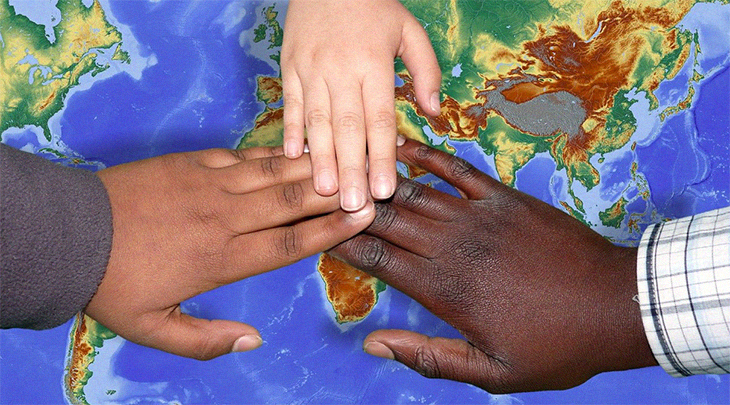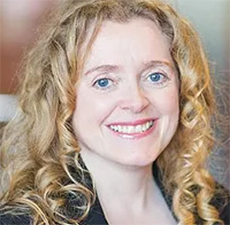
As the world faces the greatest global refugee crisis since the Second World War, the new US administration is trying to make a clear distinction between its policies and those of the Trump era. But how much of this is rhetoric, rather than action? Simultaneously, on the other side of the Atlantic, an increasingly insular UK government presents its new plans for dealing with refugees, already drawing condemnation from the UN and human rights groups. Georgette Mulheir is a global expert on child protection who has worked with refugee women and children in Ethiopia, Sudan, Bulgaria, the UK and the USA. According to her, the current approaches globally may be shocking, but they are nothing new.
“The UK rightly celebrates the Kindertransport that rescued approximately 10,000 unaccompanied Jewish child refugees from Europe in the late 1930s,” says Mulheir. “Many of their parents perished in the Holocaust, definitive evidence that this was literally a life-saving programme.” However, according to Mulheir, we are less forthcoming about the UK’s broader response at the time. As the Nazis made life in Germany and occupied countries unbearable for Jewish people, and many families tried to flee, the UK and other European countries tightened immigration controls. At the behest of President Roosevelt, a conference of 32 countries was convened in France in 1938 to address the increasing numbers of Jewish refugees.
Historians believe Roosevelt had two aims for the Evian conference: to persuade countries to accept more refugees and to deflect from his own administration’s policy of severely restricted quotas for Jewish emigrants to the USA. What happened next is well-documented. And for decades, as a world, we repeated the mantra “never again”. The international conventions on which we rely to protect human rights around the world were born from the literal ashes of the concentration camps. Similarly, the United Nations, to whom we entrust the care and protection of refugees.
When allies and governments in exile met at St James’s Palace, London, in 1941 to discuss the need for a world organisation, they declared “the only true basis of enduring peace is the willing co-operation of free peoples in a world in which, relieved of the menace of aggression, all may enjoy economic and social security; and that it is their intention to work together, and with other free peoples, both in war and peace to this end.”
“Fast forward 80 years”, says Georgette Mulheir, “and the ideals from the St James’s Palace conference are still evident among many people”. But the impact of right-wing, populist governments has resulted in the criminalisation both of seeking refuge and of supporting refugees, “to such an extent that it is becoming normalised to close our borders once more to victims of war and persecution.”
Georgette Mulheir: “The Pattern in the West of Hostility to Refugees”
Georgette Mulheir has identified a disturbing pattern among governments in Europe, as well as the USA. The first step, she says, is to redefine the problem. “If we use the term ‘refugees’, the world understands these people are fleeing in fear for their lives. If we define them as ‘economic migrants,’ communities become more defensive, believing they are coming to take ‘our’ jobs.” Particularly in times of economic crisis, increasing unemployment and overstretched public services, such as the Covid-19 pandemic, it is easy to stir up hostility to newcomers.
“Next”, says Mulheir, “governments create ever more complex regulations that make it almost impossible to claim asylum.” Once refugees arrive on our shores or borders, if they have not followed the right procedures, they are told they have broken the law.
“Thirdly, if governments can define asylum-seekers as people who have arrived illegally, there is little opposition to treating them as criminals, by locking them away.” Hidden behind the bars of locked detention centres, the anguish of refugees – and the way we are treating them – is contained and out of sight of the general public.
The final stage of this behaviour pattern is criminalising solidarity with refugees. Georgette Mulheir says, “the US, UK and other European governments are going to extraordinary lengths to discourage people from welcoming and supporting those fleeing war and persecution, even as far as prosecuting them.” She may have a point.
The global movement in people is, largely, in response to war and humanitarian disaster. And the countries that bear the brunt of taking in refugees are not in the affluent west. By far, the greatest numbers are given refuge in neighbouring countries, which often have serious troubles of their own. The greatest number of refugees per capita is in Lebanon, where one in six people is a refugee. In Jordan, it is one in 14 and in Turkey, one in 22. Sudan has recently taken in thousands of refugees from Ethiopia, despite the challenges it faces, having just emerged from one of the most brutal and corrupt dictatorships of modern times.
The criminalisation of seeking refuge
By contrast, the UK which takes far fewer refugees than most other wealthy countries, this week proposed new plans that will significantly curtail the rights of people to seek asylum. The government claims that the system is at breaking point, painting a picture of an overwhelming tide of people seeking refuge in the UK. In reality, the numbers of arrivals are considerably lower than a decade ago, but because of disinvestment in the asylum processing system, many people wait for long periods in detention before their cases are decided.
Along with many other experts, Georgette Mulheir is concerned that, in the midst of the Covid pandemic, the UK public will not prioritise the fate of refugees. “It is a peculiarly British approach,” says Mulheir, “to develop detailed and complex rules, which they hope will bore us into acquiescence”. But, as always, the devil is in the detail.
Under the new proposals, the UK government intends to deport people to ‘safe’ third countries, before any real determination has been made as to the legitimacy of their claim. The fact that they are here is automatically assumed to be criminal behaviour. Although the government uses Orwellian language, describing the new rules as being about protecting asylum-seekers, they are in fact thinly disguised attempts to deter new arrivals.
Less than three years ago, the Trump administration began systematically separating children from their families at the US/Mexican border. The motivation was, expressly, to deter people from coming. This, despite evidence that the overwhelming majority of asylum-seekers crossing into the USA had a credible fear of persecution, according to US legislation. Thousands of children were torn from their parents and placed in, often makeshift, institutions. Americans reacted viscerally and there was a massive outpouring of solidarity, with lawyers, social workers, non-profits, churches and communities mobilising rapidly, to help reunite families. This was no easy task, as the state had kept no proper records of where parents and children were sent when separated.
In August 2018, Georgette Mulheir led a programme addressing the family separation crisis, having identified gaps in the response. “Most of the efforts were focused on providing legal assistance”, says Mulheir. “Bail was posted for parents and this meant they could be freed and, if their children could be located, the family could be reunited.” But Mulheir knew from experience that, the longer children were separated and institutionalised, the more complex that reunification would become. “80 years of scientific evidence proves that separating children from their families and placing them in institutions seriously harms children’s health and development”, she said. Moreover, even in the best of institutions, levels of abuse and neglect are high. After only a few months, the trauma of institutionalisation can result in behaviours that can be difficult for parents to manage. And if they are not supported – and prepared for that eventuality – trauma can be compounded, risking future family breakdown.
Mulheir’s team worked closely with the American Bar Association and grass-roots organisations to incorporate trauma-informed social work into their legal defence practices and helped reunite hundreds of the separated children with their families. This included complex cross-border reunifications for some children whose parents had already been deported to Guatemala.
It took herculean efforts from experts like Georgette Mulheir – and considerable expense –
to undo the damage of one poor policy decision, based not on law and justice, but rather on a view that seeking refuge is a criminal activity. And it is still not over. Today, hundreds of children remain in the USA’s costly and inadequate care system, because their families have still not been located.
Criminalising solidarity with refugees
The Kindertransport in the 1930s would not have happened without dedicated individuals, such as Nicholas Winton, charities and religious groups, who disagreed with their government’s policies and found ways around the rules.
Georgette Mulheir believes some governments have learned from this history. “They know their policies of hostility towards refugees will face some popular resistance,” she says. “And, many Western countries are responding by making support for refugees a criminal offence.” In Hungary, personnel at the Helsinki Committee are unable to monitor the treatment of refugees, since the government made it illegal to help asylum-seekers. Under the Trump administration, Americans who provided food, water and medical assistance to migrants who crossed the border into the Arizona desert, were accused of people-smuggling and faced prosecution and potential prison sentences of up to 20 years. Most recently, Italy has charged more than 20 personnel from humanitarian aid organisations who rescued migrants from drowning in the Mediterranean. If convicted, they also face decades in prison. “Instead of being viewed as providing support to those in need”, says Mulheir, humanitarian personnel and grassroots activists are increasingly seen as aiding and abetting criminals.”
Is the tide turning and will the US lead the way?
The Biden administration has stated clearly that it wants to break with the draconian policies of the Trump era. But there are disturbing signs that rhetoric is not yet translating into action. Despite growing alarm in both government and Congress at the rapidly deteriorating situation in Haiti, where the state coordinates with gangs, unleashing terrifying levels of violence to suppress popular dissent, in recent weeks, the US has deported thousands of Haitians, including small children.
In February, nearly 10,000 unaccompanied children crossed the US/Mexican border, seeking refuge. The US reacts as if this is an overwhelming number. But, says Georgette Mulheir, “it all depends on priorities. During the 2018 wildfires in California, more than 250,000 people fled their homes.” Most Americans would agree these people did nothing wrong and deserved refuge and support. According to Mulheir, the numbers at the border would not seem nearly so overwhelming if we took a different approach to refugee children and families. And she is hopeful that the US will take the lead in turning the tide globally. “As a world”, she says, “we must begin to understand the desperation that leads people to make perilous journeys seeking refuge. But we must also radically rethink the way we respond, moving away from harmful and expensive incarceration and, instead, developing community-based solutions that are more humane – and cheaper.”

Georgette Mulheir’s formula to protect refugee children globally
Having worked with governments, professionals, non-profits and communities, and most importantly, refugee children and families, Georgette Mulheir has developed an approach that could revolutionise our responses to refugee crises. “What we must do”, she says, “is predict, prevent and protect.”
In these days of global interconnectedness, Mulheir is confident that technology can be used in a benevolent way to map crises and predict the movements of people within and between countries. “Disaster preparedness is nothing new in the humanitarian field”, she says, suggesting similar approaches should be applied to responding to refugees. “If we know the size and shape of the phenomenon”, she says, “we can develop appropriate responses.”
More importantly, accurate prediction can also help to prevent the refugee crisis. Whilst the structural reasons underpinning the global migration of people are not easily resolved, prediction models could inform governments’ foreign policy. “We should stop criminalising refugees and instead target the root causes of migration”, says Mulheir. But that is a longer-term project.
In the meantime, whilst millions continue to flee war and disaster, Georgette Mulheir believes we must improve the way we protect refugees, particularly children. And if we use the right prediction models and planning tools, we can prepare communities to welcome and protect the vulnerable.
“The evidence is clear that most people claiming asylum in Europe and the USA have a credible fear of persecution in their home countries”, says Georgette Mulheir. “Many unaccompanied children have experienced or witnessed horrific violence, including the murder of family members. We must provide family-based care for these children, not institutions.” Particularly among diaspora and refugee communities, foster families can be found, who can make children feel safe, helping them experience normal life and recover from trauma, whilst their own families are being traced. Mulheir has led programmes in Ethiopia doing just that and has proven that foster family care is far cheaper than institutionalising the children. But more importantly, the outcomes for children are far better.
Applying this model globally would ensure countries were prepared for influxes of refugees and responded with compassion, Mulheir says. “It would mean the world could turn ‘never again’ from an empty slogan into a permanent reality.”


